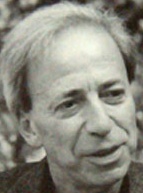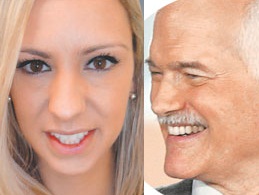a chance for real hope and change
THE CANADIAN ELECTIONS

DAVID
SOLWAY
David
Solway is the author of The Big Lie: On Terror,
Antisemitism, and Identity. His editorials appear regularly
in FRONTPAGEMAG.COM and
Pajamas Media. He
speaks about his latest book, Hear,
O Israel! (Mantua Books), at frontpage.com.
On
May 2 of this year, Canadians went to the polls and generated
a set of electoral results that defied the collective wisdom
of the nation’s pollsters, editors, political pundits
and think tankers. Conservative Prime Minister Stephen Harper
was given the majority government that had eluded him over the
previous two election cycles—and a substantial majority
it was. The best he could have hoped for, according to the commentariat,
was yet another minority government presiding over a fractious,
multi-Party House of Commons, with little chance of passing
a Conservative budget and implementing Conservative legislation.
He was regularly lampooned in Canada’s mainstream left-wing
media as cold, unlikeable, domineering and “scary,”
apparently harboring a “secret agenda” to turn the
country into a far right, semi-police state. Fortunately, ordinary
Canadians thought otherwise.
The
Liberal Party, which styles itself as the “Natural Governing
Party” of Canada and which had been in power for most
of the last century, met the worst electoral defeat of its long
and epochal—and scandal-plagued—history. It was
ignominiously reduced to rump status in parliament, a mere 34
seats to the Conservatives’ 167. The Liberals had pinned
their hopes on the intellectual lustre of their leader, acclaimed
author and Ivy League prof Michael Ignatieff, who had spent
most of his career outside of Canada, teaching in Europe and
the U.S. He was, presumably, to play the part of Elisha to Pierre
Trudeau’s Elijah, donning the mantle of the “intellectual
giant” who was also a university scholar and author and
who had gradually snaffled the country to the left during his
controversial tenure. Trudeau had captivated the public with
his charisma and Gallic charm, his eloquence, his marriage to
a beautiful (if unstable) woman, his sandal-wearing hippiness,
his pirouette behind the Queen’s back when he succeeded
in repatriating the Constitution, and many other feats of derring-do
that arguably caused far more harm than good.
But
Ignatieff, popularly known as “Iggy,” could never
arouse the electorate. He came across as pompous, self-infatuated,
rather stodgy, and like a modern version of Shakespeare’s
Coriolanus, seemed uncomfortable flipping hamburgers and kissing
babies. Worse, he was seen as more American than Canadian, parachuted
in to revive the Party’s flagging prospects. This was
perhaps his greatest liability. Canadians tend to distrust Americans
and to regard them with a mixture of condescension and pity,
when they are not denouncing them as cowboys, rubes and warmongers.
No
less surprising than the Conservatives’ stunning victory
and the Liberal collapse was the unexpected surge of the hard
left New Democratic Party, or NDP, led by the opportunistic
Jack Layton. Earning hefty salaries, he and his parliamentarian
wife, Olivia Chow, lived for years in subsidized government
housing. As well, Layton, a vigorous supporter of mandatory
public health care, had no compunction jumping the queue and
undergoing medical treatment in a private clinic. No matter.
A caviar socialist can do no wrong.
Formerly
a minor player in the country’s motley parliament, the
NDP’s appeal to the programmatic left had ensured it of
a gadfly presence in the House, if not of administrative influence.
Under Layton’s clever minstrelsy, all this has now changed.
Buoyed by its 102 seats, the NDP constitutes the Official Opposition
and brandishes considerable clout in upcoming budgetary and
policy debates. In many ways, the NDP, given its close affiliation
with organized labor, its courting of the Islamic vote, its
intention to pass Cap-and-Trade, impose carbon tariffs, raise
the corporate tax rate, withdraw our troops from Afghanistan,
and steer hundreds of billions of dollars into social welfare
programs, resembles the Democratic Party in the U.S. and José
Luis Rodriguez Zapatero’s Socialist Workers Party (PSOE)
in Spain.
It
should be noted, however, that of its 102 seats, 58 were picked
up in Quebec, largely at the expense of the province’s
independence Party, the Bloc Québécois, which
was reduced from the 47 seats it held at parliament’s
dissolution to an infinitesimal 4. Like the NDP, the Bloc is
strongly socialist in its political orientation, a similarity
upon which the NDP was able to capitalize. But after several
terms in Parliament, once as the Official Opposition, the Bloc’s
tiresome, one-note, strident vuvuzela and its lack of productive
results eventually paled upon Quebec voters.
Without
a single member from the ROC (Rest of Canada), the Bloc was
always something of an anomaly. For Americans to understand
this electoral curiosity, they would need to imagine a parliamentary
system in which an independence Party representing one of their
most populous states, say California or Texas, is regularly
elected to the halls of power in order to achieve the secession
of the state from the body of the nation. One might call it
the Catalan model—Catalonia has long agitated for political
dismemberment from Spain, in some respects like Scotland from
the United Kingdom and Flanders from Belgium. But in Canada
the threat is real and ongoing, far more so than in other Western
nations, and in the Quebec referendum of 1995 the country came
within a 1% vote differential of breaking up.
What
is rather delectable in the current situation is that the NDP
now finds itself between a ROC and a hard place. As Official
Opposition, with 44 seats won outside of Quebec, it must act
as a national unity Party if it wishes to retain credibility
and a viable future. At the same time, it must also answer to
the demands of Quebec separatists and so-called “sovereignty-association”
sentiment if it holds out any hope of retaining the Quebec vote
that catapulted it to its present position of eminence.  Adding
to its predicament, much of its Quebec caucus consists of young
people, students and raw first-timers, clearly unready for the
exercise of power. For example, one of its candidates, twenty-something
Ruth Ellen Brosseau, whose passion is rescuing stray animals,
was happily vacationing in Las Vegas during the election, ran
in a jurisdiction where she does not live, and does not speak
passable French, the language of 98% of her constituents. Only
in Quebec, one might say.
Adding
to its predicament, much of its Quebec caucus consists of young
people, students and raw first-timers, clearly unready for the
exercise of power. For example, one of its candidates, twenty-something
Ruth Ellen Brosseau, whose passion is rescuing stray animals,
was happily vacationing in Las Vegas during the election, ran
in a jurisdiction where she does not live, and does not speak
passable French, the language of 98% of her constituents. Only
in Quebec, one might say.
It
will be interesting times ahead for Canada. The Bloc is moribund
for now, but should not be counted out in the future. Liberals
will be looking inward, struggling to rebuild. A product of
the perennially freakish West Coast, the Green Party with its
measly one seat is a non-entity, though it can be expected to
side with the NDP in stirring up as much trouble as it can for
the Conservatives—and for the country. The socialist zombie
is always on the prowl, hunting for victims.
Nonetheless,
the Conservative majority augurs reasonably well for the next
four years. Cap-and-Trade is going nowhere. The Global Warming
scam is likely to be rumbled or at least deflected. Those who
desire to split the country will be up against a formidable
opponent. The deficit will be tackled. Union pressure will be
resisted. Islamic organizations and fellow-traveling NGOs may
have a tougher time advancing their programs. Immigration patterns
should grow more selective, tailored to the country’s
needs rather than to multicultural bromides. Israel will have
a good and honorable friend at the United Nations—very
different from the hypocritical “honest broker”
position adopted by the Liberals and in direct contrast to the
pro-Muslim slant of the NDP. The business environment will continue
to improve, thanks to less wasteful entitlement disbursement
and lower taxes, leading to a more favorable job market. Resource
exploitation will be increasingly pursued. The economy will
be further strengthened.
All
in all, Americans can surely sympathize.